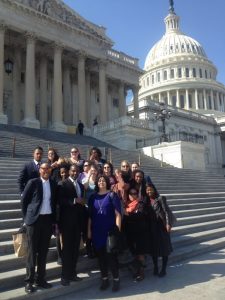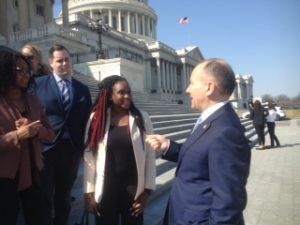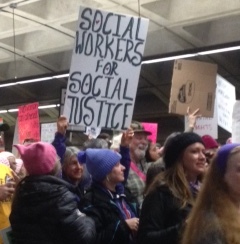Social Work
Learning Human Rights as a Student
I can admit that I never fully understood the importance of human rights until I became a student. Being a student provides individuals a chance to learn and see things from a different perspective, which they may otherwise not have. My experience as a student provided me the opportunity to learn and see human rights, or the lack of human rights, in action. The biggest eye opening experience that revealed my sheltered idea of human rights was my first time out of the country, on a study aboard trip. Children were on the street homeless without families, left with the decision of choosing to spend their day working for money instead of going to school. Others are left in the worst possible living conditions because the government will not allow them to get the proper identification to work or even move. In class, we learn through lectures, conversations, videos, and/or pictures of how human rights affect individuals around the world, but there is nothing compared to seeing it in real life. Being a witness to the lack of human rights in other countries is how I officially learned and saw the need for change.
Growing up in America as a member in the majority population, it was easy to fall in a trap of thinking everyone is protected by the basic human rights. In the past couple of years, I have grown to realize my naïve thinking and have actually become quite ashamed of those thoughts. I needed to take the blinders off and have a good look around to notice not only how people are treated in other countries but also our own. My internship, assisting homeless families has shown me that the human rights issues are not only affecting other countries but our home as well. The human right of adequate standard of living, including housing, has been a major issue in our communities. It may seem minimal compared to the lack of human rights in other countries but still an issue that many families face. Finding affordable housing is something families struggle to achieve even those who are working 40 plus hours a week. In my specific county, great strides have been taken to tackle this concern but I cannot say the same for other areas. Many people may think that housing and a standard of living is earned, but in reality is it still a human right everyone deserves. I do believe that education is key to learning about the world around us and becoming more accepting and understanding.
Shelby Davey
Master of Social Work Candidate
West Chester University (PA)
Teaching Political Advocacy on Capitol Hill
In this post, we revisit an elective course introduced in the first post of this blog series focused on teaching during the Trump presidency. As previously described, the social work elective is centered on the social welfare and human rights implications of the first 100 days of the presidency. To say the least, it’s been a fast-paced course that has challenged my students and I to really pay attention to national politics and how such policies impact our country’s most vulnerable individuals at the local level. This post will highlight an experiential learning opportunity at the US Capitol.
On March 9, 2017, students boarded a chartered bus to Washington, DC to participate in the 3rd annual Social Work Students Advocacy Day on the Hill organized by the Congressional Research Institute for Social Work and Policy (CRISP). The event provided an opportunity for students to meet with Congressional members and their staff to advocate on federal legislation critical to social workers and the populations they serve. For all the students, this was their first time advocating on Capitol Hill. To prepare, we spent time in class beforehand discussing what to expect and the students also watched an on-line tutorial developed by CRISP. As suggested by CRISP, students lobbied for the passage of H.R. 1290: Improving Access to Mental Health Act and H.R. 1289: The Dorothy I. Height and Whitney M. Young, Jr. Social Work Reinvestment Act. The students also lobbied against the passage of H.R. 610, which includes the Choices in Education Act of 2017 and No Hungry Kids Act.
Students also engaged in advocacy related to policies important to them. For example, students used personal stories to advocate for the prevention of the repeal and replacement of the Affordable Care Act (ACA) and “defunding” Planned Parenthood. Students were able to articulate how the ACA was an important social welfare policy that protected many citizen’s right to healthcare and other vital behavioral health services. Students also discussed how maintaining women’s rights to accessible healthcare was related to the services provided by Planned Parenthood. As the day went on, the students became more confident in their abilities to communicate with elected officials and their staff with some students even seeking out additional meetings on their own.
Participating in Advocacy Day was an important opportunity for my students to recognize that even at the federal level, politicians are just fellow citizens, who work for us. Students expressed this realization both during a debrief of the experience on the bus ride home and in class the next week. One student stated “that’s just what I needed to do” in regard to engaging in the political process. Some students even expressed their own political ambitions and participated in a mini-seminar focused on social workers running for office.
As educators, we must help students understand that while politicians have become “celebrities” they are not untouchable, meaning we have the right and duty to reach out to our elected officials and share our thoughts on how we want them to vote on policies important to us as citizens and professionals. It is our responsibility, as those teaching about human rights, to also teach our students they play a role in advocating for policies that work toward human rights for all.
Photos taken by the author in Washington, DC on March 9, 2017.
Christina M. Chiarelli-Helminiak
Human Rights and Social Work Elective Focused on Trump’s First 100 Days
Following the election of Donald Trump as the 45th US President, the Teaching Human Rights (THR) blog featured a series of posts focused on how we, as human rights educators at the college level, addressed the election in our classrooms. During the Spring 2017 semester, the THR blog will include posts focused on teaching about human rights during the first 100 days of the Trump Presidency.
The first post in this series features a new syllabus recently uploaded to the THR Syllabus Database. The Spring 2017 elective entitled, Human Rights and Social Work: Responding to Domestic and International Crises, will focus on the human rights and social welfare policy implications of the first 100 days of the Trump presidency. As outlined below, each week will feature a social justice issue as suggested by students in the course. Students will be actively engaged in observing the political processes and advocating for the realization of social justice and human rights through policy advocacy.
The course outline includes:
- Perspectives on Human Rights and Social Work
- Human Rights and Social Justice
- Rights-Based Approach
- International and National Political Systems
- Women’s Rights
- LGBTI Rights
- Racism as a Human Rights Issue
- Social and Economic Rights
- Immigrant Rights
- Sustainability
- Business Ethics
- Foreign Relations
In addition, the course will include participation in Social Work Students Advocacy Day on the Hill and a PhotoVoice Community Exhibition. During Advocacy Day, sponsored by the Congressional Research Institute for Social Work and Policy (CRISP), students will engage in policy advocacy on behalf of social welfare legislation. More information available at: http://crispinc.org/2017-student-advocacy-day-on-the-hill/. The PhotoVoice Exhibition will provide students the opportunity to visually represent the human rights and social welfare policies studied over the course of the semester. Subsequent posts on the THR blog will provide reflections on the Advocacy Day and PhotoVoice Exhibition.
We would be remiss to say that human rights will not be impacted by President Trump and his administration. It is up to us, as human rights educators, to teach our students, future human rights leaders, how to continue to promote the realization of human rights for all.
Photos taken by the author at the Women’s March in Washington, DC on January 21, 2017.
Christina M. Chiarelli-Helminiak




